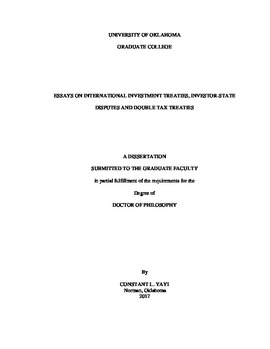| dc.description.abstract | Chapter 1 explores the effects of international investment treaties on institutional quality. Capital importing countries use bilateral investment treaties (BITs) as a means to attract foreign investors who see these investment agreements as an effective tool to employ in case of an investment dispute. Several countries, often at the expense of their sovereign rights, have engaged in unbridled foreign capital competition, which has resulted in a massive proliferation of BITs since the 1990s. This chapter contributes to the debate over whether BITs harm the institutional quality (IQ) of signatory countries due to the possibility established by BITs of resorting to international jurisdictions to settle potential investment disputes. Using a panel of data from 132 countries over the period 1984–2012, this study suggests that BITs have no significant effects on IQ. However, the results reveal a significant positive effect of BITs on the IQ of Southern countries. While BITs do not significantly affect some IQ components such as corruption, law and order, quality of bureaucracy, government stability, and investment profile, I find that BITs have a positive and significant effect on the socioeconomic conditions of Southern countries. Specifically, I find that South-North BITs have a significant and positive effect on socioeconomic conditions in host countries. In contrast, I find no significant effects of South-South BITs on IQ. I conclude that South-North rather than South-South investment cooperation BITs are beneficial to Southern countries, by improving their socioeconomic conditions.
Chapter 2 investigates some new determinants of investor-state disputes. In recent years, there has been a proliferation of disputes claims brought against investment host states by foreign investors, at the International Center for Settlement of Investment Disputes (ICSID). This trend seems to be a natural consequence of the growing number of bilateral investment treaties (BITs) signed since the 1990s. This chapter seeks to further investigate the determinants of investor-state disputes by adding to existing analyses of claimants’ home state characteristics and exploring other factors such as trade agreements and export partners that could potentially influence the incidence of disputes. The research herein provides strong evidence that weak institutions and the stock of FDI inflows into host states are key factors in explaining investor-state disputes. Also, BITs are not the only pass-throughs of investment disputes. I found that trade agreements are also determinant factors of investor-states disputes due to the investment protection provisions embedded in these agreements. Also, lingering colonial ties that allow for greater economic exchange between former colonial powers and their former colonies constitute a channel for investment disputes. These findings confirm that institutional quality still matters and suggest that developing countries that are primarily capital-importing countries via the signing of investment treaties could avoid unnecessary depletion of their scarce resources into international arbitration if they invest in improving their institutions.
Chapter 3 analyses the effects of double tax treaties on tax revenues. The recent surge of cross border investments has raised awareness on the question of double taxation, making policies on profits taxation of Multinational Corporation more than ever relevant. Governments in many countries rely heavily on tax revenues for different purposes such as provision of infrastructures, functioning of public administration and other social services. Double tax treaties negotiated between two sovereign states aim to reduce or eliminate the burden of double taxation on the same taxpayer and for the same subject matter. The literature on double tax treaties generally suggests that double tax treaties might be harmful to treaty partners especially when there is an asymmetry between countries in terms of flows of foreign direct investment. This chapter examines the effects of Double Taxation Treaties on Tax Revenues using a panel data of 37 countries over the period 1990-2010. Using fixed effect and system GMM methods, the results show a bell shape relationship between tax revenue and tax treaties. The findings suggest that countries signing tax treaties should expect at least two effects: a positive effect of tax treaties on tax revenues in the short run followed by a diminishing effect in the long run. | en_US |
